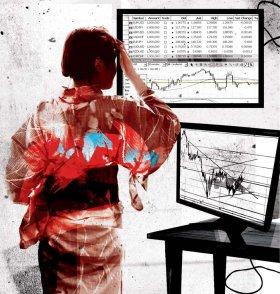The Deal: Right Place, Right Time
 By Shaun Davies
By Shaun Davies
The sale of currency trading Website FXOnline to IG Group will come to epitomize the dream of the foreign entrepreneur in Japan.
 James Gow, founder and CEO of FXOnline.
James Gow, founder and CEO of FXOnline.
James Gow had 10 million yen and a barely-formed idea when he co-founded online currency trading firm FXOnline in 2002. An experienced finance professional and long-term Tokyo resident, Gow sensed the Internet could change the nature of foreign exchange trades, though by his own admission, the concept was initially vague. He quit his job, raised a small amount of capital and started work on a Website that aimed to make forex trading cheaper and easier for Japanese traders of all kinds—a risk that would eventually pay off handsomely.
In late September, London-based financial derivatives trading company IG Group paid 21.9 billion yen for an 87.5 percent stake in FXOnline—almost certainly the highest price paid for a company started by a foreigner in Japan. Gow retained a 12.5 percent stake in the company and stayed on as CEO.
“For a Western company doing business in Japan we were effectively in the right place at the right time: the right place being Japan and the right time being the start of the second internet boom,” Gow says.
For a Western company doing business in Japan we were effectively in the right place at the right time: the right place being Japan and the right time being the start of the second internet boom.”
“When we started we totally underestimated two things—the potential and the amount of work…FXOnline helped instigate the growth of FX trading in Japan. It was late by global standards but quite radical here at the time.”
The company’s strategy was to offer traders in Japan tighter spreads and lower fees than Japanese broking houses, through an online platform that achieved a balance between functionality and complex trading possibilities. In forex trading, the spread is the difference between the price at which a broking house buys a currency and the price it is willing to sell that same currency for. The spread is expressed in pips, the smallest unit used to measure forex trades. In 2002, Japanese broking houses typically offered spreads of 50 to 60 pips and charged fees of 30,000 to 40,000 yen per transaction. The first incarnation of FXOnline offered spreads of around three pips with a commission of just 3000 yen. The company initially used a “white label” model— taking the trading system of another firm and adapting that to the Japanese market.
“We didn’t know how to market ourselves and we didn’t know how to tell people we existed. We had a trickle of people coming through by word-of-mouth,” Gow says.
 While “Kimono traders” have become a part of everyday life, Gow says the majority of FXOnline’s traders are men.
While “Kimono traders” have become a part of everyday life, Gow says the majority of FXOnline’s traders are men.
Illustration by Phillip Couzens.
“As time went on we cut our teeth and improved. We decided to move away from the white label model and we went totally independent. That was in 2005, when we also stopped charging commissions.”
Ease of access and lower costs gave small-time investors in Japan the chance to dabble in the massive foreign exchange market, which has a daily turnover of almost $4 trillion. FXOnline’s growth since going independent has been phenomenal— in the financial year ending March 2008 the company turned a profit of around 2.9 billion yen. Its client base has grown to around 33,000. It’s tempting to attribute this growth to so-called “kimono traders”—housewives who use their spare time to dabble in forex and other market mischief. Indeed, Gow was quoted at length in a 2007 article in the British newspaper The Times, which claimed these Japanese women had “quietly seized control of global currency markets.”
But Gow says stories about the phenomenon have been blown out of proportion—85 percent of FXOnline’s customers are men. “We have a huge cross-section of traders, but only 15 percent of our traders are women. More than half of our traders are between the ages of 30 and 45—we tend to attract the more experienced traders,” Gow says. “We’ve also got a few corporations and we’ve got one ‘white label’ client ourselves.” FXOnline was Gow’s second stab at starting a business in Japan—his first try, with an international trading company, was by his own admission “a complete flop.”
“Starting this business in Japan was a double-edged sword. Where it cuts against you is language and culture. But where it cuts in our favor is that online forex trading was invented in the West,” Gow says. FXOnline will now migrate to IG Group’s trading system, which will give the company’s clients access to a wider range of trading opportunities, including CFDs, equities and commodities.
“We’re going to ditch the old workhorse of a system that’s done us so well, maybe by December…(the IG Group system) has a lot of new bells and whistles, but what’s more exciting is that it offers three- or four-thousand new products,” Gow says.





